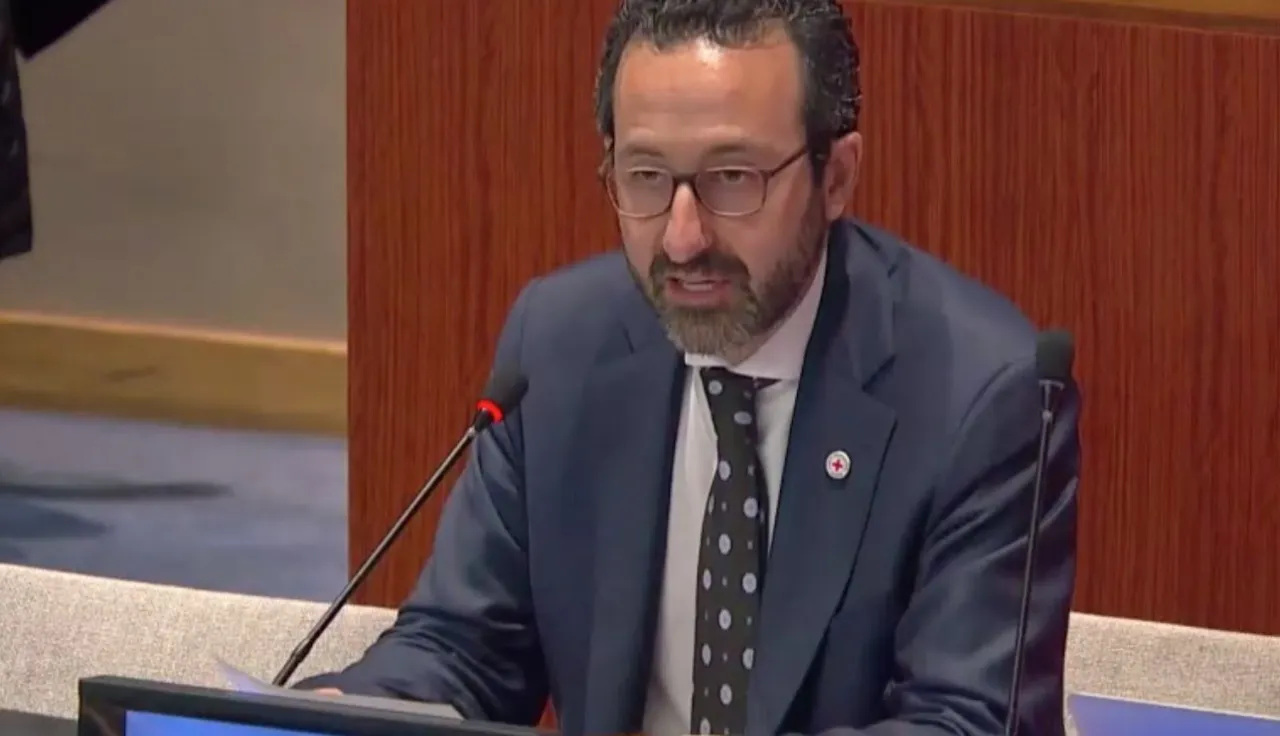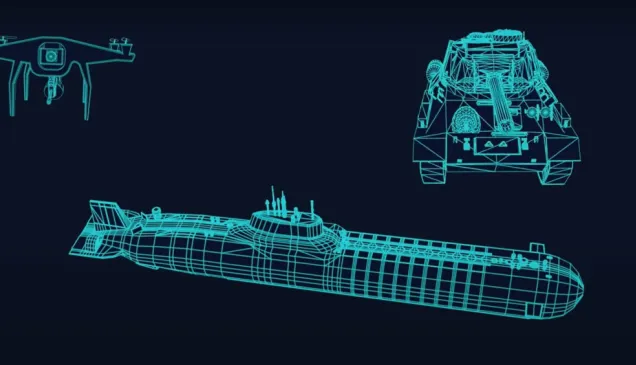Military needs can never justify using inhumane or indiscriminate weapons

Statement to UN General Assembly First Committee: General debate on all disarmament and international security agenda items
Full statement. Abridged version delivered by Mr. Robert Mardini, Permanent Observer to the UN and Head of Delegation, ICRC New York
Mr Chair, Excellencies, Ladies and Gentlemen,
The International Committee of the Red Cross (ICRC) welcomes this opportunity to share its perspectives as a humanitarian organization mandated to protect and assist people affected by armed conflict and other situations of violence, and to prevent suffering by promoting respect for international humanitarian law (IHL) and universal humanitarian principles.
Against the backdrop of untold suffering in armed conflicts, notably in parts of the Middle East and Africa, the 70th anniversary of the 1949 Geneva Conventions has been a forceful reminder that even wars have limits. These include the prohibitions of indiscriminate means and methods of warfare and of weapons of a nature to cause unnecessary suffering, as well as the obligation to respect and ensure respect for IHL, including in arms transfer decisions.
The 70th anniversary of the Geneva Conventions also reminds us that IHL strikes a careful, pragmatic balance between military necessity and humanitarian imperatives. The recognition that military needs can never justify using inhumane or indiscriminate weapons has also driven arms control and disarmament. Indeed, weapons limitations of the kind under the consideration of the First Committee are also critical means to mitigate the impacts of armed conflict when it occurs, reducing risks to civilians and saving lives.
Mr Chair,
Next year will mark a more somber anniversary: 75 years since nuclear weapons were first used, in Hiroshima and Nagasaki. These horrific events have left an indelible mark on humanity's conscience. The International Movement of the Red Cross and Red Crescent has testified to the devastation of these cities and the human suffering on an unimaginable scale caused by the atomic bombs, including the long-term effects of radiation exposure on tens of thousands of survivors. Our first-hand knowledge of these catastrophic humanitarian consequences, our inability to provide adequate humanitarian assistance to the victims of a nuclear attack, and the general incompatibility of nuclear weapons with IHL have underpinned our calls since 1945 to prohibit and eliminate nuclear weapons.
In 2017, 122 States responded to our call by adopting the Treaty on the Prohibition of Nuclear Weapons (TPNW), providing hope for a future without nuclear weapons. The TPNW's comprehensive prohibition of nuclear weapons represents a long-awaited and essential step towards implementing Article VI of the Nuclear Non-Proliferation Treaty (NPT), and creates a further disincentive for proliferation. By signing and ratifying the TPNW, States are sending a clear signal that any use, threat of use or possession of these weapons is unacceptable in humanitarian, moral and legal terms.
Such a signal is needed more than ever in a world in which the risk of use of nuclear weapons is growing to levels not seen since the end of the Cold War. The erosion of the nuclear disarmament and arms control framework signals a deeply worrying trend towards a new nuclear arms race.
Concerted efforts to reduce nuclear risks are therefore urgently needed. The 2020 Review Conference of the NPT will be a critical opportunity to implement long-standing risk reduction commitments and halt and reverse the new nuclear arms race. The NPT was adopted in response to the devastation that would be visited upon all mankind by a nuclear war, as evidenced by the unspeakable suffering of the victims of the atomic bombings (hibakusha) nearly 75 years ago and to this day. Irrespective of their views on the TPNW, the ICRC urges all NPT States Parties to find common ground in the humanitarian rationale that motivated the development of the NPT in the first place, to protect future generations and humanity as a whole.
Mr. Chair,
The use of weapons in outer space – be it through kinetic or non-kinetic means, using space- or ground-based weapon systems – can have significant impacts on civilians on earth. This is because technology enabled by space systems permeates most aspects of civilian life, making the potential consequences of attacks on such systems a matter of humanitarian concern.
Services essential to civilian survival rely on space objects. These include navigation satellite systems, weather satellites supporting disaster prevention and mitigation, and satellite phone services for humanitarian and emergency relief operations. The use of weapons in outer space could put these essential services at risk, for example if dual-use space objects were disabled or destroyed by direct attacks, or incidentally damaged by space debris caused by kinetic attacks on military objects.
IHL rules already afford some protection to civilians: they limit the choice and use of weapons in outer space by prohibiting direct attacks against civilian objects, and indiscriminate and disproportionate attacks.
In its Working Paper submitted in March to the Group of Governmental Experts on Further Practical Measures for the Prevention of an Arms Race in Outer Space (PAROS GGE), the ICRC urged States to acknowledge these IHL limits and the potentially significant humanitarian consequences of using weapons in outer space. Asserting that IHL applies does not legitimize the weaponization of, nor the conduct of hostilities, in outer space. IHL applies without prejudice to the UN Charter's prohibition on the resort to force between States and the Outer Space Treaty, nor to any initiatives aimed at limiting the military use of outer space in the future.
Mr Chair,
As at many points in history, new technologies could fundamentally change how war is waged. Their potential human costs and the profound legal and ethical questions they raise for humanity deserve urgent attention.
Science and technology developments – whether in computing, artificial intelligence (AI) and robotics, or chemistry, biology, and materials technology – may be inevitable. But their weaponization is not. It is a choice that must be taken in light of humanitarian, legal, military and ethical considerations. It must be based on realistic assessments of these technologies and their actual – or foreseeable – humanitarian impact in armed conflict.
In recent years, sophisticated cyber-attacks have succeeded in disrupting the provision of services essential to the civilian population, such as health care and electricity and water supply systems. In our increasingly digitalized world, these attacks are reportedly becoming more frequent and their impacts risk becoming more severe.
While most cyber operations we know of have been conducted outside armed conflicts, when cyber capabilities are used during conflicts, which some States have acknowledged doing, they must comply with IHL just as they would when using any other means or method of warfare, new or old. Acknowledging the applicability of IHL does not imply the legitimization of cyber warfare. Any use of force by States – be it cyber or kinetic – remains governed by the UN Charter, in particular the prohibition against the use of force, and international disputes must be settled by peaceful means. What IHL provides is an additional layer of protection against the effects of hostilities in the unfortunate event of an armed conflict.
The ICRC is aware that unique characteristics of cyberspaces raise questions about the interpretation and application of IHL rules. In the coming months, the ICRC will publish a position paper on IHL and cyber operations during armed conflict, for submission to the Open-Ended Working Group (on developments in the field of information and telecommunications in the context of international security) and the Group of Governmental Experts (on advancing responsible State behaviour in cyberspace in the context of international security). We welcome the important work of these bodies and urge them to affirm that IHL imposes limits to the use of cyber operations during armed conflicts. Doing so does not imply that new rules might not be needed. But if new rules are developed, they should build upon and strengthen existing law.
The ICRC's concern with autonomous weapon systems is loss of human control over the use of force, which would present serious risks for protected persons in armed conflict – both civilians and combatants no longer fighting – and bring significant risks of violations of international humanitarian law, while raising fundamental ethical concerns about leaving life-and-death decisions to sensors and software.
It is clear, that existing IHL rules – in particular distinction, proportionality, and precautions in attack – already set limits to the development and use of autonomous weapon systems. After all, it is humans who plan, decide on, and carry out attacks, and it is humans, not machines, that comply with and implement these rules, and that are accountable for violations. However, IHL does not provide all the answers.
In view of the unique characteristics of autonomous weapon systems, which select and attack targets without human intervention, and the unique legal and ethical issues they raise, the ICRC continues to call on States in the Convention on Certain Conventional Weapon's (CCW) Group of Governmental Experts (GGE) on Lethal Autonomous Weapon Systems to set limits on autonomy in weapon systems. At a minimum, States must determine the type and degree of human control necessary in practice to ensure compliance with IHL and ethical acceptability.
Artificial intelligence (AI) and machine learning are also set to profoundly influence the conduct of warfare. The ICRC sees important implications in three areas. First, its use to control military hardware, in particular the growing diversity of armed unmanned systems (in the air, on land, and at sea). Second, AI-enabled cyber capabilities could increase the speed, number and types of attacks and affect the consequences, as well as enabling the spread and creation of disinformation that can result in real risks for civilians on the ground. Third, and perhaps most far reaching, its use for decision-making. Possible uses that have been raised for "decision-support" or "automated decision-making" systems range from decisions about whom – or what – to attack and when, and whom to detain and for how long, to decisions about overall military strategy – even on use of nuclear weapons - as well as attempts to predict, or pre-empt, adversaries.
The ICRC's view, as put forth in a paper published in June, is that it will be essential to take a human-centred approach, preserving human control and judgement in any use of AI for tasks, and in decisions, that may have serious consequences for life in armed conflict and which are governed by IHL. AI and machine learning systems remain tools that can be used to augment and improve human decision-making, not to replace it.
Mr. Chair,
The increasing urbanization of warfare, characterized by bombing and shelling of cities, places civilians at high risk of harm. This risk is magnified when parties employ weapons that are ill-adapted for use in urban environments. The ICRC remains deeply concerned by the devastating direct and indirect civilian harm caused by the use of explosive weapons with a wide impact area in populated areas. Impacts are not limited to civilian death, injury, disability and mental harm, and destruction of civilian homes and infrastructure. We also typically observe significant indirect impacts such as the disruption of water and electricity supply, health care and other services essential to civilian survival when critical civilian infrastructure is damaged or destroyed by explosive weapons. Their use is also a major driver of displacement.
On 18 September, ICRC President Peter Maurer and UN Secretary-General António Guterres jointly appealed to States and all parties to armed conflict to avoid the use of such weapons in populated areas due to the significant likelihood of indiscriminate effects. They urged States to take prompt action in a number of areas – including targeting, training, data collection and civilian casualty mitigation – and to put in place and implement policies and practices that will enhance the protection of civilians and facilitate compliance with IHL in urban warfare, including policies and practices to avoid the use of explosive weapons with a wide impact area.
The ICRC welcomes all efforts made in this direction, notably the Vienna Conference on Protecting Civilians in Urban Warfare hosted by Austria, where a large number of States expressed firm support for the elaboration of a political declaration to address the civilian harm caused by explosive weapons in populated areas. A political declaration can be a powerful tool to bring about tangible progress, provided it contains strong and unequivocal commitments to change behaviour and to stop the tide of civilian deaths and suffering. We urge States to spare no effort to achieve this goal.
Finally, Mr. Chair,
The ICRC urges States to seize the opportunity of the forthcoming Review Conferences of the Anti-Personnel Mine Ban Convention next month and of the Convention on Cluster Munitions in 2020, presided respectively by Norway and Switzerland, to join these crucial IHL treaties and to redouble their efforts to faithfully implement them. Fulfilling their promise of a world free of anti-personnel mines and cluster munitions will save lives, limbs and livelihoods.
And more States must join the Arms Trade Treaty to fulfil its promise of a responsible arms trade. If the ATT is to achieve its purpose of reducing human suffering, it is vital that humanitarian imperatives – particularly ensuring respect for IHL – are systematically considered in arms transfer decision-making at every level, as required by the terms of the treaty. Humanitarian imperatives must not be trumped by economic or security interests. This can only have positive knock-on effects on peace and security.
Thank you.



